What is a Research Engagement Network (REN)?
Since the COVID-19 pandemic, there has been increased awareness that people from minoritised groups are less likely to be included in, and participate in, health and care research. In 2022, NHS England published Increasing diversity in research participation: A good practice guide for engaging with underrepresented groups. The national Research Engagement Network (REN) Development Programme was launched in 2022 and jointly funded by NHS England and the Department of Health and Social Care. It has funded Integrated Care Systems (ICS) to grow their local research engagement networks by working with local voluntary, community and social enterprise (VCSE) sector organisations to engage these “underserved” communities. The key aims of the REN Development programme include increasing diversity, inclusion and participation in health and care research, and building long-lasting trusting relationships with communities.
BACKGROUND IMAGE FOR PANEL
Why community engagement?
Community engagement is essential for creating inclusive, effective, and sustainable solutions to the issues that matter most to communities. It is a way of empowering individuals and ensuring that the voices of people from underserved or marginalised groups are heard. By involving communities in decision-making about health and care research, we will be able to meaningfully address the real health and care needs of communities. Whist promoting a sense of ownership and accountability, this will also build trust between communities, health and care system and researchers. This collaborative approach will lead to stronger, more resilient communities and health and care systems that are responsive, culturally relevant, and better positioned for long-term success in tackling health inequalities.
BACKGROUND IMAGE FOR PANEL
Phase one of the Pan-Sussex Diversity in Research Engagement Network Project (REN 23/24)
In October 2023, Sussex Integrated Care System (ICS), in partnership with Brighton and Sussex Health Research Partnership (HRP) was awarded £100,000 of funding from NHS England to work in partnership with voluntary, community and social enterprise (VCSE) organisations across Sussex, with the aim to engage minoritised groups from areas of deprivation and to improve research participation.
With additional funding through the My University Hospitals Charity, the REN was established with key aims to:
- Create a regional network of diverse community researchers to support Sussex-based health and care research
- Build the capacity and capability of community researchers through development training and qualitative interviewing experience
- Engage minoritised groups from areas of deprivation in Sussex and investigate how to improve their participation in health and care services and research.
Support was sourced from the University of Chichester to ensure robust academic evaluation.
With a local focus on Racially Minoritised/Global Majority communities and Lesbian, Gay, Bisexual, Transgender and non-binary people, local VCSE partners recruited fifteen community researchers who are members of these communities. The community researchers received training and support to interview community members from targeted areas of deprivation across Sussex, with interviewees recruited by wider place-based VCSE partners, thus broadening the partnership working integral to the REN.
Our partners
The Project was a collaboration with:
- Brighton and Sussex Health Research Partnership (HRP)
- NHS Sussex
- University Hospitals Sussex
- My University Hospitals Sussex
- NIHR Regional Research Delivery Network (RRDN) South East [formally known as the Clinical Research Network Kent Surrey Sussex (CRN KSS)]
- Sussex Partnership NHS Foundation Trust (SPFT)
- Trust for Developing Communities (TDC)
- Diversity Resource International (DRI)
- Sussex Interpreting Service (SIS)
- Brighton & Hove Switchboard
- The Clare Project
- Crawley Community Action
- Voluntary Action Arun and Chichester
- Voluntary Action for Eastbourne, Lewes District, and Wealden (3VA) [only involved in Phase One]
- University of Chichester
BACKGROUND IMAGE FOR PANEL
Leadership
The project was led by Anna-Marie Bibby-Jones, Senior Research Fellow for Equality Diversity & Inclusion, Sussex Partnership NHS Foundation Trust; Jane Lodge, Associate Director of Public Involvement and Community Partnerships, Sussex Health and Care Partnership; and Virginia Govoni, Head of the Health Research Partnership. Kaye Duerdoth, Deputy Chief Executive, Trust for Developing Communities (TDC), was the lead voluntary community organisation partner. Anna-Marie’s time is generously funded by University Hospitals Sussex and their charity, My University Hospitals Sussex.
BACKGROUND IMAGE FOR PANEL
Making it happen
Each VCSE partner recruited one or two community researchers (fifteen in total) with lived experience of the communities and marginalised groups that were the focus of the research. Community Researchers were required to have experience or an interest in community engagement, to be open-minded, non-judgmental, and curious, recognise the value of research, and be able to commit time to the project’s training and research.
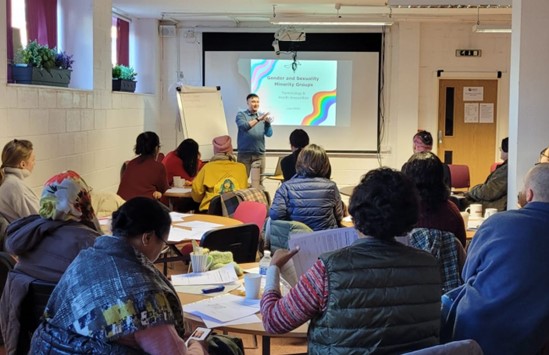
The Trust for Developing Communities devised and conducted two training sessions, led by Terry Adams, where volunteers discovered how best to collect qualitative data in their communities.
Over the course of two months, the Community Researchers conducted 42 interviews. The research elicited views on:
- Experiences and perceptions of the NHS
- Accessing health and care information
- Awareness and understanding of health and care research
- Participating in health and care research
Key recommendations
- Research teams should consider how negative experiences and perceptions of marginalisation by mainstream society might impact engagement in health and care research.
- Conduct further research with Transgender, Non-binary, and Intersex (TNBI) communities to identify challenges they face when engaging with the NHS.
- Ensure translation and interpretation support is included in all health and care research activities.
- Health and care research teams should adopt a co-creative approach, exploring partnerships with relevant VCSEs at the early stages of planning a research study.
- Integrate community engagement and co-creation approaches into the planning of health and care research to support healthcare topics important to local communities.
- Maximise the accessibility of online information through local NHS websites.
- Ensure that marketing and communication of research materials reflect a broad demographic profile, allowing potential respondents to see themselves represented.
- Researchers should be mindful of unintentional barriers to participation that may arise due to language or learning differences.
The project findings are explained in detail in the Project Report.
BACKGROUND IMAGE FOR PANEL
Coming together
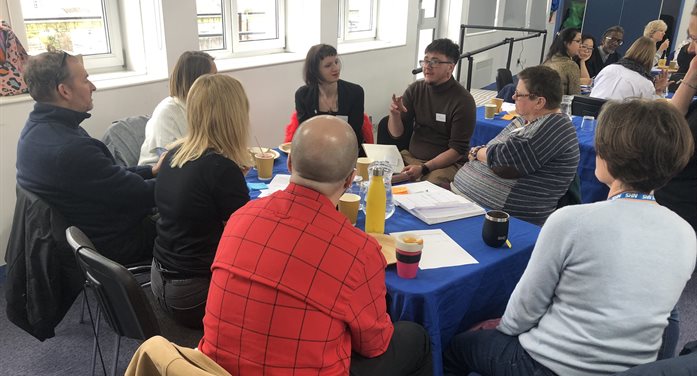
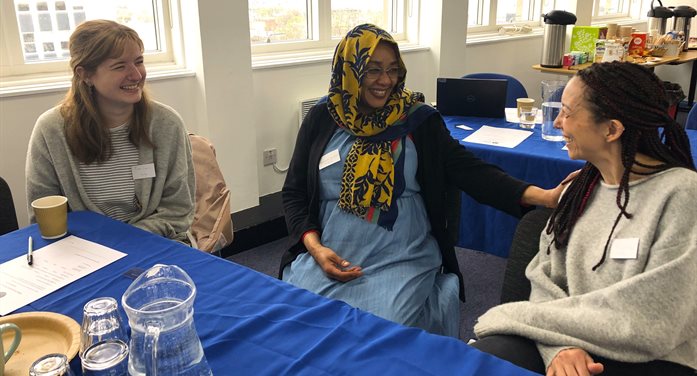
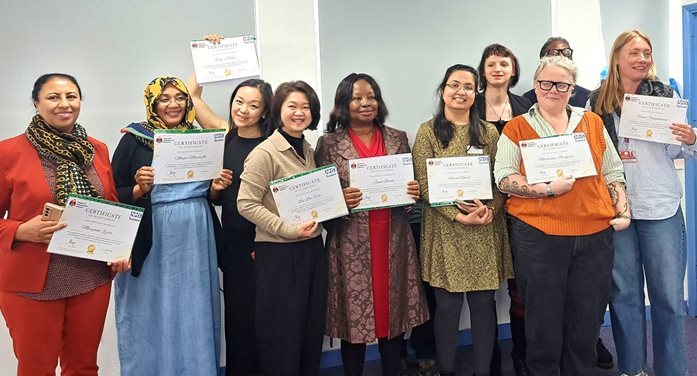
On Tuesday 23 April 2024, we brought the community researchers together with the Trust for Developing Communities, and other community organisations in Sussex for a Celebration Event, to highlight their experiences and achievements.
The community researchers who spoke explained what they learned from their experiences, both about themselves and their communities. They also talked about how their own experiences in healthcare were echoed by those they interviewed. Some community members said they had not engaged in research before because they had never been asked. Many described compounded barriers to participation and said they felt marginalised and discriminated against by the NHS in general. Trust was a key issue.
Partnering community organisations formed a discussion panel and we heard about what the REN meant to them and what they wanted to see next. There was agreement that more space and resources for co-production was needed, and we need to do more research on intersectionality.
Everyone came out of the celebration event touched by what they had heard, and by the resilience and determination of the researchers and their communities.
BACKGROUND IMAGE FOR PANEL
Bridging activities (REN 24-25)
Following the first phase, the project received additional funding from NHS England for bridging activities until the next funding call. The REN was also successfully awarded funding from the NIHR Regional Research Delivery Network (RRDN) South East (formally Clinical Research Network Kent, Surrey & Sussex).
Funds were used in several ways including:
- supporting VCSE leads to attend fortnightly REN Leadership meetings,
- supporting our core VCSE partners to stay engaged in REN work including attending a workshop facilitated by Nora Davies from the Sussex Knowledge Exchange and Impact Support Programme to discuss joint aspirations for the future of the REN and to agree 'ways of working'.
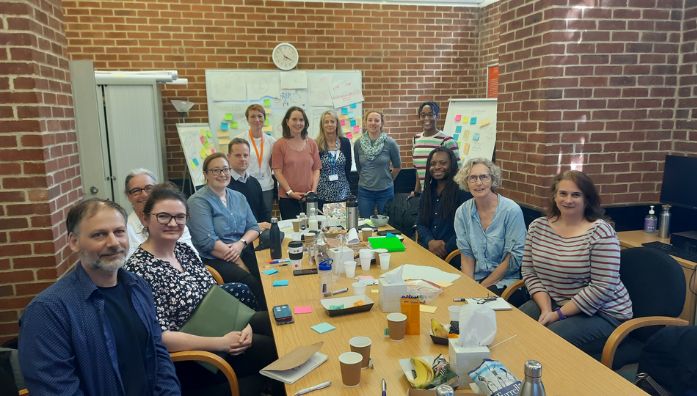
- For community researchers to be remunerated for their time planning and being filmed for a dissemination film about their experiences in the REN project and the power of community research.
- For community researchers to attend and present their work at the HRP Clinical Academic conference on the 17 July 2024.
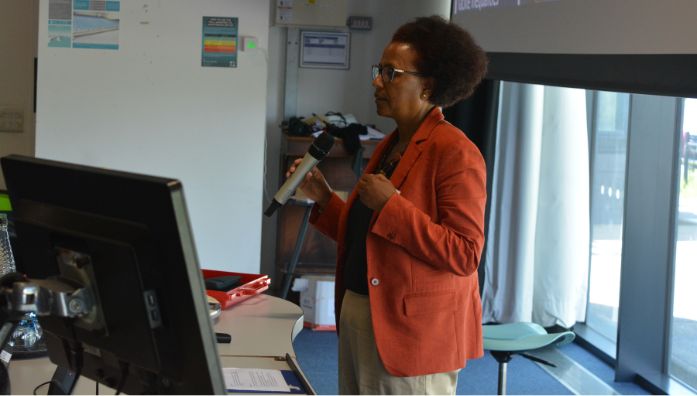
Phase Two of the Pan-Sussex Diversity in Research Engagement Network Project: Sustaining community research for diversifying local health and care research engagement (REN 24/25)
In September 2024, our project proposal for continuing to develop our REN activities and learning focusing on community research was provisionally accepted.
A strong community recommendation from Phase One of the REN, was that to seriously tackle health inequalities, community research should be embedded within the health and care research life-cycle. REN project partners will embrace this challenge by developing a new partnership with the Sussex Cancer Research Centre, which launched July 2024, and community researchers, to design a diverse community engagement plan. This could serve as an exemplar of good practice for other research teams.
Over the next few months, we will develop a tailored Continued Professional Development programme for our community researchers and organisations. This will help to build the capacity of our communities and community researchers as they spend more time working more closely and engaging with health and care researchers.
We will also work on a number of community engagement projects with our three local authorities West Sussex County Council, Brighton & Hove City Council and East Sussex County Council via its Research Collaborative Hub. This engagement work comes under the umbrella of the Research Ready Communities partnership work led by NIHR Regional Research Delivery Network (RRDN) South East. This work will focus on exploring how communities can be supported by network partners to design and lead their own community research projects.
BACKGROUND IMAGE FOR PANEL
Community Voices for Involvement and Engagement of Women in Mental Health Research (REN 24-25)
We were also recently successful in our bid for funding to conduct a research engagement project focused around the mental health of women and people who use women's health and care services.
Sussex has the poorest mental health in the South-East and minimal contribution to national health and care research recruitment. Community researchers, NHS Sussex, public health teams, and Sussex Health Research Partnership will collaborate to enhance engagement and participation in mental health research. This collaborative effort focuses on women, people who use women's health services, and intersectionality. Through three work packages, the project will:
- Deliver tailored training on ethics and cultural humility in mental health community research and co-develop interactive training on collaborative community research. This training will be of benefit to community researchers and academic health and care researchers who will all join this project as research partners who can learn from each other.
- Boost women’s engagement in mental health research through community researcher-led creative participatory action projects for homeless, neurodivergent, English not the first language, older (50+) isolated, and Trans, Non-Binary & Intersex groups (TNBI).
- Develop a Mental Health REN linking communities and research partners. Learning will inform future development of NHS Sussex and Public Health services, and relevant research.
BACKGROUND IMAGE FOR PANEL
Impact of the Sussex REN
The REN has already made several far-reaching impacts which we hope to expand on over the duration of the project work: This includes impact on the:
- Development of relationships between community organisations and the health and care research system. Especially between VCSEs, Health Research Partnership, NHS Sussex, Local Authorities and National Institute for Health and Care Research (NIHR).
- Lives of the community researchers
- Approach to community research within Sussex by health and care researchers.
- Awareness of opportunities for communities to engage and participate in health and research e.g. Be Part of Research
- Work of partner organisations who are now broadening their scope in terms of Equality, Diversity and Inclusion in research.
The HRP was recently successful in gaining pump-priming funds from NHS Sussex to offer small grants to home-grown research projects who demonstrate a clear commitment to co-production and community inclusion. Details of how to apply for these grants will be made available soon.